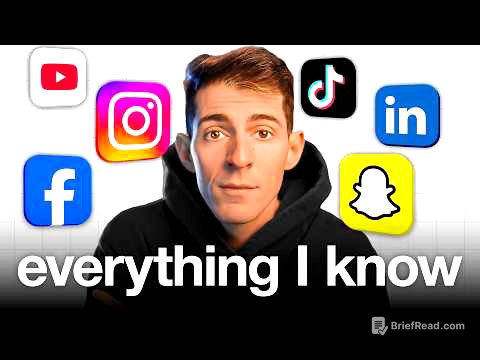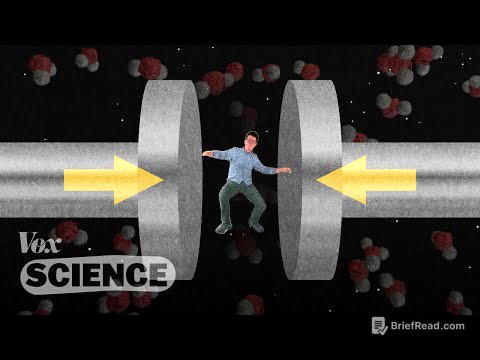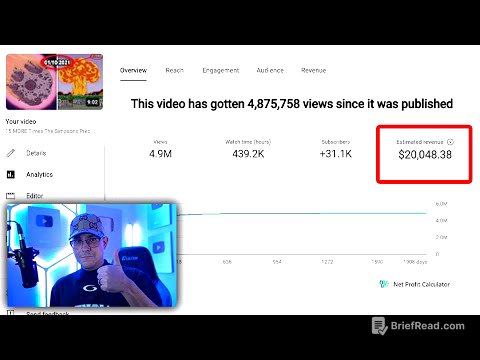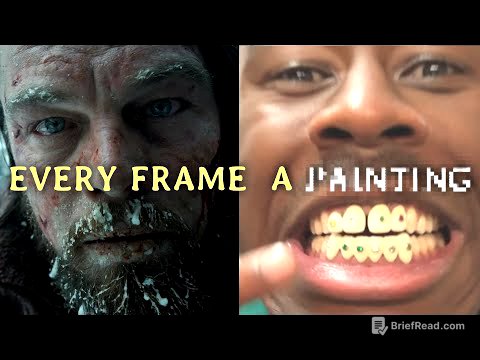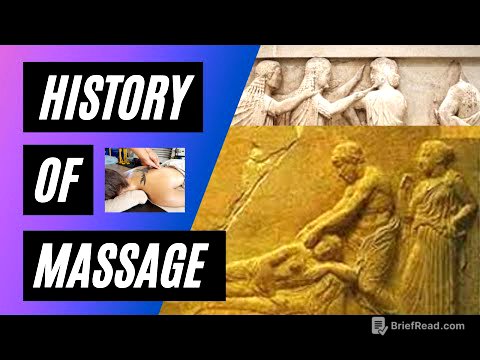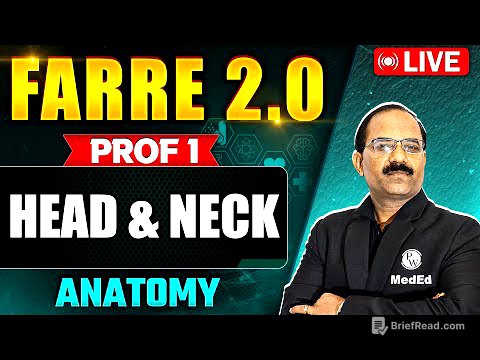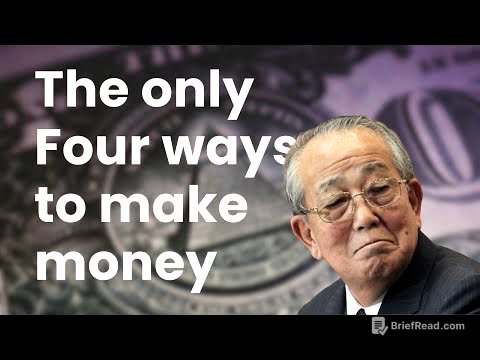TLDR;
This YouTube video transcript is a wild ride through a drug-fueled adventure in Las Vegas, following a journalist and his attorney as they cover the Mint 400 race. The summary captures the chaotic energy, paranoia, and dark humor of the original text, highlighting key events, character interactions, and the overall sense of a journey spiraling out of control.
- The story begins with a drug-induced hallucination and quickly escalates into a series of bizarre encounters, including a hitchhiker, a money woman, and a cast of characters at the Mint Gun Club.
- The duo's drug use intensifies, leading to paranoia, erratic behavior, and a constant struggle to maintain control.
- The journalist grapples with the meaning of their journey, the nature of the American dream, and the socio-psychic factors driving their actions.
- The story culminates in a series of chaotic events at the Flamingo Hotel, including a confrontation with a "savage Lucy" and a decision to flee the city.
Part One [0:01]
The story starts with the narrator and his attorney driving towards Las Vegas when the drugs begin to take effect. The narrator experiences a hallucination of huge bats swooping around the car. His attorney, oblivious, is tanning and dismisses the narrator's concerns. They are on their way to cover the Mint 400 race, with a sporting magazine footing the bill. The trunk of their car is filled with a vast array of drugs, alcohol, and ether. The narrator expresses concern about the ether, knowing its potential to cause depraved behavior. As they continue, the attorney listens to the radio and sings along, while the narrator grapples with the tape recorder playing "Sympathy for the Devil."
Seizure of Three Hundred Dollars [12:52]
The narrator's attorney picks up a hitchhiker, a naive kid who has never ridden in a convertible. The attorney makes strange comments, leading the narrator to worry about what the kid will think. The narrator contemplates killing the hitchhiker to prevent him from reporting them to the authorities. He tries to explain their mission to the hitchhiker, claiming they are on their way to Las Vegas to find the American dream. The narrator recounts a story about receiving a call from headquarters via a dwarf with a pink telephone, instructing him to make contact with a Portuguese photographer named Lacerda in Las Vegas. The attorney advises renting a fast car and arming themselves. The narrator explains that the Mint 400 is a rich off-road race. The attorney suggests buying a Vincent Black Shadow motorcycle. The narrator recalls getting only $300 from a "pig woman" in Beverly Hills. He and his attorney discuss needing unlimited credit and embracing the American dream. They decide they need a car, cocaine, a tape recorder, and Acapulco shirts to prepare for the trip.
Strange Medicine on the Desert [20:52]
The narrator reflects on the hitchhiker's remark about never having ridden in a convertible. He considers giving the car to the kid but dismisses the idea. He fantasizes about drag racing in Las Vegas and challenging other drivers. He asserts that their trip is an affirmation of the American character. The car veers off the road, and the attorney claims to have a heart problem. The narrator gives him animals from their drug stash. The attorney screams for music and clarity. The narrator tells the hitchhiker they are doctors of journalism on their way to cover the main story of their generation. The attorney tells the hitchhiker they are going to Vegas to kill a "skag baron" named Savage Henry. The hitchhiker climbs out of the car and runs away. The narrator and attorney switch places and continue driving, opening a bottle of tequila. The attorney suggests stopping at Mescal Springs to take a swim, but the narrator insists on reaching the Mint Hotel before the press registration deadline. The attorney suggests chewing a blotter of acid. The attorney spills cocaine, and the narrator accuses him of being a narcotics agent. The attorney pulls out a gun. The narrator threatens to have him chopped into hamburger. The attorney says it will be a miracle if they can check into the hotel before the narrator turns into a wild animal. They approach Las Vegas.
Hideous Music and the Sound of Many Shotguns [39:06]
The narrator and his attorney arrive at the Mint Hotel. The attorney is unable to handle the registration procedure, forcing them to wait in line. The narrator tries to remain calm and rehearses what to say to the clerk. When he finally reaches the clerk, he babbles incoherently. The clerk says their room is not ready and that someone is looking for them. The narrator panics, seeing the clerk's face transform into a moray eel. The attorney takes the note and leads him away, claiming to be Dr. Gonzo. They find stools at the bar and order drinks. The attorney opens the envelope and asks who Lacerda is. The narrator can't remember. The attorney says Lacerda is waiting for them on the 12th floor. The narrator sees reptiles gnawing on people and blood on the carpet. The attorney says he went upstairs to see Lacerda and mentioned Savage Henry, causing Lacerda to freak out. The attorney says they have a Vincent Black Shadow, scaring Lacerda. The narrator points out a group staring at them, which the attorney identifies as the press table. They decide to get it over with, and the attorney will get the room.
Covering the Story [50:06]
The narrator and his attorney finally get into their suite around dusk. The attorney immediately orders food and drinks from room service, citing the need for vitamin C. The narrator's hallucinations subside. The only problem is a giant neon sign outside the window. The narrator points out the electric snake coming straight at them. The attorney tells him to stop talking about snakes and lizards. The attorney says the narrator scared the people at the press table by waving a marlin spike and yelling about reptiles. The attorney eats two mescaline pellets. The narrator suggests carving up a grapefruit and making a rum punch, maybe tossing in a blotter. They realize they gave the car to someone in the parking lot and can't find the ticket. The attorney calls the garage, pretending to be Dr. Gonzo, and asks for the car to be washed and ready in 30 minutes. The man remembers his face. The narrator says they'll probably have a big net ready for them when they show up. The TV news shows horrifying disasters in Laos. The attorney screams to turn it off. They pick up the car, and the attorney goes into a drug coma and runs a red light. The narrator takes the wheel, feeling sharp. He wants to hear what people are saying but decides not to use the shotgun mic. He drives down Main Street, listening to music. They come upon the turnoff to the Mint Gun Club and hear shotguns. The narrator stops the car and sees people firing shotguns into the air. He parks the car and wanders into the crowd, leaving his attorney in his coma. He buys a beer and watches the bikes checking in. He considers signing his attorney up for the dune buggy competition. He asks about the entry fee and mentions having a Vincent Black Shadow. The desk man is unfriendly and wearing a revolver. The attorney appears, half-naked, and confronts the desk man. The narrator pushes him away, saying they won't accept the Black Shadow. The attorney screams that they'll be back. They drive back to the highway, and the attorney wants to get out of town.
A Night on the Town [1:01:50]
The racers are ready at dawn, but the race doesn't start until nine, so the narrator and others kill time in the casino. The bar opens early, and people are drinking and gambling. A man in a Harley-Davidson t-shirt tells a story about getting beaten up and given money to go to Las Vegas for the Mint 400. The correspondent from Life nods sympathetically and orders drinks. The frog-eyed woman claws at his belt. The man from Life says he's damn near intolerably handsome down where he is. The narrator turns away, feeling it's too horrible. He reflects that they are the cream of the sporting press, gathered to cover the Mint 400. Even before the race, there are signs they might be losing control. Outside, the lunatics are playing with their motorcycles. The first ten bikes blast off at nine. The narrator and others watch, then go back to the bar. More bikes go off every two minutes, disappearing into the dust. By noon, it's hard to see the pit area. The idea of covering the race conventionally is absurd. The Ford Motor Company provides a press Bronco, but the narrator abandons it and goes back to the bar. He feels it's time for an agonizing reappraisal of the scene. He makes many heavy notes.
Paranoid Terror [1:21:57]
It's Saturday midnight, and the narrator's memories are hazy. He has a pocket full of kino cards and cocktail napkins covered with scribbled notes. One note says to get the Ford man to demand a Bronco for race observation purposes. Another says to sign on Paradise Boulevard, which is stopless and topless. Las Vegas is a society of armed [ __ ], and gambling is the kicker. The narrator recalls a friend who won heavily at craps in Reno but ended up in debt. Mainline gambling is heavy business, and Las Vegas makes Reno seem like a grocery store. The narrator was not at ease drifting around the casinos with a car full of marijuana and a head full of acid. He had several narrow escapes. He tried to drive the car into the laundry room of the Landmark Hotel but the door was too narrow. They drove to the Desert Inn to catch the Debbie Reynolds Harry James show. The narrator tells his attorney that it's important to be hep. The attorney advises going to the Tropicana to see Guy Lombardo. They drive around in circles, ending up at the Desert Inn. Two thugs yell at them for parking on the sidewalk. The attorney waves a five-dollar bill and claims to be a friend of Debbie's. They get inside, but the tux man refuses to let them in. They promise to be quiet, but they lose control. Debbie Reynolds is yucking across the stage in a silver afro wig. They are dragged out by goons. The attorney shouts that they'll see about this. They drive to the Circus Circus casino and park near the back door. The narrator gives the attorney the key to the trunk for the ether. They stagger up the stairs, laughing stupidly. The narrator describes the effects of ether. They approach the turnstiles and have trouble getting inside. They mumble incoherently. They are put through the turnstiles and turned loose inside. The narrator describes the madness of the Circus Circus. He sees himself lying in bed in the Mint Hotel, staring out the window when a vicious nazi drunkard appears 200 feet tall in the midnight sky, screaming gibberish. He says this is not a good town for psychedelic drugs. Reality itself is too twisted. The narrator says good mescaline comes on slow.
No Sympathy for the Devil [1:36:30]
The attorney says the Circus Circus is getting to him and he's getting the fear. The narrator tells him they came to find the American dream. The attorney says that's what gives him the fear. The ether was wearing off, the acid was long gone, but the mescaline was running strong. They were sitting at a small round table moving in orbit around the bartender. The narrator points out two women [ __ ] a polar bear. The attorney says not to tell him those things. He signals the waitress for two more Wild Turkeys. He says this is his last drink and asks how much money the narrator can lend him. He has to leave the country tonight. The narrator tells him to calm down. The attorney shouts that one more hour in this town and he'll kill somebody. The narrator says he'll lend him some money. They'll go outside and see how much they have left. The attorney asks if they can make it. The narrator says it depends on how many people they [ __ ] with between here and the door. The attorney wants to leave fast. They pay the bill and get up very slowly. The narrator shouts at the waitress for a bill. The attorney asks if they pay her to screw that bear. The narrator says he's just kidding. He gets the attorney as far as the edge of the bar, but he refuses to get off until it stops turning. The narrator steps off and turns around to wait for him, but he won't move. The narrator steps on the merry-go-round and hurries around the bar, approaching his attorney on his blind side. He pushes him off. He staggers into the aisle and utters a hellish scream as he loses his balance and goes down thrashing into the crowd. The narrator approaches him with his hands in the air, trying to smile. He says he fell and they should go. The attorney says someone kicked him in the back. The narrator says it was probably the bartender. The attorney wants to get out of here and asks where the elevator is. The narrator says not to go near the elevator. They walk fast along the big indoor midway, then out through a bank of glass doors and across the grass downhill to a parking lot where the car waits. The attorney says the narrator should drive. He thinks there's something wrong with him.
I Quote From Art Link Letter [1:43:16]
The narrator and his attorney get to the Mint. The narrator parks on the street in front of the casino. Neither one of them can pass for drunk. They are both hyper-tense. They hurry through the casino and up the rear escalator. They make it to the room, but the key won't open the door. The attorney says they've changed the lock and searched the room. Suddenly, the door swings open. They hesitate, then hurry inside. No sign of trouble. The attorney says to bolt everything. He's staring at two Mint Hotel room keys in his hand. He asks where the one with number 1221 on it came from. The narrator says that's Lacerda's room. The attorney says they might need it. He suggests going up there and blasting him out of bed with the fire hose. The narrator says they should leave him alone. He gets the feeling he's avoiding them. The attorney says the Portuguese son of a [ __ ] is dangerous and watching them like a hawk. He asks if the narrator has made a deal with him. The narrator says he talked with him on the phone while the attorney was out getting the car washed. He said he was turning in early so he can get out there to the starting line at dawn. The attorney utters an anguished cry and smacks the wall. He says Lacerda got hold of his woman. The narrator laughs. The attorney says that little blonde groupie with the film crew. The attorney says he sodomized her. The narrator says that the [ __ ] honkies are all the same. The attorney opens a new bottle of tequila and slices a grapefruit in half with a Gerber mini magnum. The narrator asks where he got the knife. The attorney says room service sent it up. He slices the grapefruit into quarters, then into eighths, then sixteenths, then begins slashing aimlessly at the residue. He says he should have taken Lacerda out when he had the chance. The narrator remembers the girl they had a problem with on the elevator. The attorney had made a fool of himself. The girl had asked what class he was in. He had plunged his hand into the pocket of his black plastic jacket and turned to face the people crowded into the rear of the elevator. The narrator had stepped off and grabbed his arm, jerking him out just in time. The attorney was laughing wildly. He said it's serious now. That girl understood. She fell in love with him. Now, many hours later, he was convinced that Lacerda had somehow got his hands on the girl. He says they should go up there and castrate him. The narrator says he should put the blade away and get his head straight. He has to put the car in the lot. He was backing slowly towards the door. He says to take a shower and he'll be back in twenty minutes. He leaves quickly, locking the door behind him and taking the key to Lacerda's room. He thinks about Lacerda, a poor geek sent out on a reasonable assignment who is now plunged into a world beyond his ken. He wonders what they are doing out here. He reaches in his pocket for the room key. He is going to deal with the car and get back to that room, then hopefully get straight enough to cope with whatever might happen at dawn. He sees the Life man twisted feverishly into the telegraph booth. The red shark was out on Fremont where he left it. He drove around to the garage and checked it in. His attorney was in the bathtub when he returned, submerged in green water. He had a new am/fm radio plugged into the electric razor socket. The narrator turned the volume down and noticed a hunk of chewed-up white paper beside the radio. The attorney seemed not to notice the sound change. The narrator asked if he ate this. He ignored him. The narrator says he's an evil son of a [ __ ] and better hope there's some Thorazine in that bag. The attorney says to turn the music up and put that tape on. The narrator picks up the radio and notices that it is also a tape recorder. The attorney says he wants a rising sound. The narrator says he's doomed. He's leaving here in two hours and then they're gonna come up here and beat the mortal [ __ ] out of him with big saps. The attorney says he digs his own graves. The narrator says to put it on and not make him use this. His arm lashed out of the water, the hunting knife gripped in his fist. The narrator says he's gone as far as he can with this water head. This time it's a suicide trip. He wants it. He's ready. The narrator says he'll give him all the time he needs at his normal rates. The bathroom was like the inside of a huge defective woofer. The floor was full of water. The narrator moved the radio as far from the tub as it would go, then left and closed the door behind him. Within seconds, he was shouting at him. The narrator rushed back inside, thinking he'd sliced off an ear by accident. He was reaching across the bathroom toward the white formica shelf where the radio sat. The narrator grabbed it away from his hand. The volume was so far up that it was hard to know what was playing. The narrator knew that White Rabbit had finished. The peak had come and gone. The attorney wanted more. He yelled to back the tape up. He needed it again. His eyes were full of craziness. He seemed on the verge of some awful psychic orgasm. He screamed to let it roll just as high as the [ __ ] can go and when it comes to that fantastic note where the rabbit bites its own head off, he wants the narrator to throw that [ __ ] radio into the tub with him. The narrator stared at him, keeping a firm grip on the radio. He said he'd be happy to ram a goddamn 440-volt cattle prod into that tub with him right now, but not this radio. He laughed [ __ ] they'd make him explain it. The attorney screamed to just tell them he wanted to get higher. The narrator said he was right. This is probably the only solution. He picked up the tape radio, which was still plugged in, and held it over the tub. He said to let him make sure he has it all lined up. He wants him to throw this thing into the tub when White Rabbit peeks. The attorney fell back in the water and smiled gratefully. The narrator hit the play button, and White Rabbit started building again. Almost immediately, he began to howl and moan. The narrator let the song build while he sorted through the pile of fat ripe grapefruit next to the basin. He got a good vita blue fastball grip on the [ __ ] and just as White Rabbit peeked, he lashed it into the tub like a cannonball. The attorney screamed crazily, thrashing around in the tub like a shark after meat, churning water all over the floor as he struggled to get hold of something. The narrator jerked the AC cord out of the tape radio and moved out of the bathroom very quickly. The machine kept on playing, but now it was back on its own harmless battery power. He could hear the beat cooling down as he moved across the room to his kit bag and fetched up the mace can. Just as his attorney ripped the bathroom door open and started out, his eyes were still unfocused, but he was waving the blade out in front of him like a man who meant to cut something. The narrator shouted mace and waved the mace bomb in front of his watery eyes. He stopped. He hissed that he'd do that, wouldn't he. The narrator laughed, still waving the bomb at him. He said there's nothing in the world like a mace high. 45 minutes on your knees with the dry heaves, gasping for breath. It'll calm him right. The attorney stared in his general direction, trying to focus. He muttered that he'd do it, wouldn't he. The narrator said hell, just a minute ago he was asking him to kill him and now he wants to kill him. What he should do god dammit is call the police. The attorney sagged. The narrator nodded. He said there's no choice. He wouldn't dare go to sleep with him wandering around in this condition with a head full of acid and wanting to slice him up with that goddamn knife. The attorney rolled his eyes for a moment, then tried to smile. He mumbled that he just wanted to carve a little Z on his forehead, nothing serious. He shrugged and reached for a cigarette on top of the TV set. The narrator menaced him again with the mace can. He said to get back in that tub, eat some reds, and try to calm down. He shrugged and smiled distractedly as if everything he'd said made perfect sense. He said he really needs some sleep. He has to work tomorrow. He shook his head sadly and turned back toward the bathroom. He waved him off. He said to try to rest and don't let him keep him up. The narrator nodded and watched him shuffle back into the bathroom, still holding the blade but now he seemed unaware of it. The acid had shifted gears on him. The next phase would probably be one of those hellishly intense introspection nightmares. The narrator watched the door close behind him and he quietly slid a heavy sharp-angled chair up in front of the bathroom knob and put the mace can beside the alarm clock. The room was very quiet. He walked over to the TV set and turned it on to a dead channel. White noise at maximum decibels, a fine sound for sleeping. A powerful continuous hiss.
Hellish Speed [2:07:49]
The narrator lives in a quiet place where any sound at night means something is about to happen. It's hard to adjust to a city gig where the night is full of sounds. He drowns it all out with the fine white drone of a cross-eyed TV set. He ignores that nightmare in the bathroom. He's just another ugly refugee from the love generation. Some doom-struck [ __ ] who couldn't handle the pressure. The attorney has never been able to accept the notion that you can get a lot higher without drugs than with them. The narrator once lived down the hill from Dr. Blank, a former acid guru who later claimed to have made that long jump from chemical frenzy to preeta natural consciousness. One fine afternoon, the narrator stopped by the good doctor's house with the idea of asking him what sort of advice he might have for a neighbor with a healthy curiosity about LSD. He parked on the road and lumbered up his gravel driveway, pausing en route to wave pleasantly at his wife who was working in the garden under the brim of a huge seeding hat. The narrator thought it was a good scene. The old man is inside brewing up one of his fantastic drug stews and here we see his woman out in the garden pruning carrots or whatever, humming while she works some tune he failed to recognize. But it would be nearly ten years before he would recognize that sound for what it was. Dr. Blank was trying to hum him off. That was no old lady out there in that garden. It was the good doctor himself, and his humming was a frantic attempt to block him out of his higher consciousness. The narrator made several attempts to make himself clear, just a neighbor come to call and ask the doctor's advice about gobbling some LSD in his shack just down the hill from his house. He did after all have weapons, and he liked to shoot them, especially at night when the great blue flame would leap out along with all that noise and yes, the bullets too. He was careful never to kill more than he could eat. He realized he could never properly explain that word to this creature toiling here in its garden. Had it ever eaten meat? Could it conjugate the verb hunt? Did it understand hunger or grasp the awful fact that his income averaged around 32 dollars a week that year? There was no hope of communication in this place. He recognized that, but not soon enough to keep the drug doctor from humming him all the way down his driveway and into his car and down the mountain road. He forgot LSD. He stuck with hash and rum for another six months or so until he moved into San Francisco and found himself one night in a place called the Fillmore Auditorium. One gray lump of sugar and boom. In his mind, he was right back there in the doctor's garden. Not on the surface, but underneath, poking up through that finely cultivated earth like some kind of mutant mushroom. A victim of the drug explosion. A natural street freak just eating whatever came by. He recalls one night in the Matrix when a road person came in with a big pack on his back, shouting anybody want some LSD. He got all the makings right here. All he need is a place to cook. The manager was on him at once. The narrator never saw him after that night, but before he was taken away, the road person distributed his samples. The narrator went into the men's room to eat mine, but only half at first. He ate the first half but spilled the rest on the sleeve of his red Pendleton shirt. He saw one of the musicians come in. He nearly grabbed his arm and began sucking on it. The narrator wondered what would happen if some Kingston Trio young stockbroker type might wander in and catch them in the act. He thought with a bit of luck it'll ruin his life forever, thinking that just behind some narrow door in all his favorite bars men in red Pendleton shirts are getting incredible kicks from things he'll never know. Strange memories on this nervous night in Las Vegas. It seems like a lifetime or at least a main era. San Francisco in the middle sixties was a very special time and place to be a part of. Maybe it meant something. But no explanation, no mix of words or music or memories can touch that sense of knowing that you were there and alive in that corner of time in the world. Whatever it meant. History is hard to know because of all the hired [ __ ]. But even without being sure of history, it seems entirely reasonable to think that every now and then the energy of a whole generation comes to a head in a long fine flash for reasons that nobody really understands at the time and which never explain in retrospect what actually happened. The central memory of that time seems to hang on one or five or maybe 40 nights or very early mornings when he left the Fillmore half crazy and instead of going home aimed the big 650 Lightning across the Bay Bridge at 100 miles an hour wearing LL Bean shorts and a Butte sheep herder's jacket, booming through the Treasure Island tunnel at the lights of Oakland and Berkeley and Richmond, not quite sure which turn off to take when he got to the other end, always stalling at the toll gate too, twisted to find neutral while he fumbled for change, but being absolutely certain that no matter which way he went he would come to a place where people were just as high and wild as he was. There was madness in any direction at any hour. There was a fantastic universal sense that whatever they were doing was right, that they were winning. That was the handle. That sense of inevitable victory over the forces of old and evil. They had all the momentum. They were riding the crest of a high and beautiful wave. Now, less than five years later, you can go up on a steep hill in Las Vegas and look west, and with the right kind of eyes, you can almost see the high water mark, that place where the wave finally broke and rolled back.
Western Union Intervenes [2:08:10]
The decision to flee came suddenly, or maybe he'd planned it all along. The bill was a factor. He had no money to pay it and no more of these devilish credit card reimbursement deals. They seized his American Express card after that one, and now the bastards are suing him along with the Diners Club and the IRS. Besides, the magazine is legally responsible. His attorney sorted that. They signed nothing except those room service tabs. They never knew the total, but just before they left, his attorney figured they were running somewhere between 29 and 36 dollars per hour for 48 consecutive hours. Incredible. How could it happen? By the time he asked this question, there was nobody around to answer. His attorney was gone. He must have sensed trouble. On Monday evening, he ordered up a set of fine cowhide luggage from room service, then told him he had reservations on the next plane to LA. They would have to hurry. On the way to the airport, he borrowed 25 for the plane ticket. He saw him off, then he went back to the airport souvenir counter and spent all the rest of his cash on garbage. Souvenirs of Las Vegas, plastic fake Zippo lighters with a built-in roulette wheel for 6.95, JFK half-dollar money clips for five dollars each, 10 apes that shook dice for 7.50. He loaded up on this crap, then carried it out to the car and dumped it all in the back seat. He stepped into the driver's seat in a very dignified way. The white top was rolled back as always, and he sat there and turned the radio on and began thinking. How would Horatio Alger handle this situation? It crept up his spine like the first rising vibes of an acid frenzy. All these horrible realities began to dawn on him. Here he was all alone in Las Vegas with this goddamn incredibly expensive car, completely twisted on drugs, no attorney, no cash, no story for the magazine, and on top of everything else, he had a gigantic goddamn hotel bill to deal with. They had ordered everything into that room that human hands could carry, including 600 bars of translucent Neutrogena soap. The whole car was full of it, all over the floors, the seats, the glove compartment. His attorney had worked out some kind of arrangement with the mestizo maids on their floor to have this soap delivered to them. And now it was all his, along with this plastic briefcase that he suddenly noticed right beside him on the front seat. He lifted the [ __ ] and knew immediately what was inside. No Samoan attorney in his right mind is going to stomp through the metal detector gates of a commercial airline with a fat black 357 magnum on his person. So he had left it with him for delivery if he made it back to LA. Otherwise, he could almost hear himself talking to the California Highway Patrol. What this weapon, this loaded, unregistered, concealed, and maybe hot 357 magnum, what am I doing with it? Well, you see officer, I pulled off the road near Mescal Springs on the advice of my attorney who subsequently disappeared, and all of a sudden while I was just sort of walking around that deserted water hole by myself for no reason at all when this little fella with a beard came up to me out of nowhere and he had this horrible linoleum knife in one hand and this huge black pistol in the other hand, and he offered to carve a big X on my forehead in memory of Lieutenant Cali, but when I told him I was a doctor of journalism, his whole attitude changed. He suddenly hurled that knife into the brackish Mescal waters near our feet, and then he gave me this revolver right, he just shoved it into my hand, but first and then he ran off into the darkness. So that's why I have this weapon officer. Can you believe that? No. But he wasn't about to throw the bastard away either. A good 357 is a hard thing to get these days. So he figured he'd just get this bugger back to Malibu and it's mine. His risk, his gun. It made perfect sense. And if that Samoan pig wanted to argue, if he wanted to come yelling around the house, give him a taste of the bugger about midway up the femur. 158 grains of half-jacketed lead alloy traveling 1500 feet per second equals about 40 pounds of Samoan hamburger mixed up with bone splinters. Madness. Madness. And meanwhile, all alone with the great red shark in the parking lot of the Las Vegas airport. To hell with this panic. Get a grip. Maintain. For the next 24 hours, this matter of personal control will be critical. Here he is sitting out here alone on this [ __ ] desert in this nest of armed loonies with a very dangerous carload of hazards, horrors, and liabilities that he must get back to LA. Because if they nail him out here, he's doomed, completely [ __ ]. No question about that. No future for a doctor of journalism editing the State Pan Weekly. Better to get the hell out of this attivistic state at high speed right. But first, back to the Mint Hotel and cash a 50 dollar check, then up to the room and call down for two club sandwiches, two quarts of milk, a pot of coffee, and a fifth of Bacardi Anejo. Rum will be absolutely necessary to get through this night, to polish these notes, this shameful diary, keep the tape machine screaming all night long at top volume. Allow me to introduce myself. I'm a man of wealth and taste. Sympathy, not for me. No mercy for a criminal freak in Las Vegas. This place is like the army. The shark ethic prevails. Eat the wounded. In a closed society where everybody's guilty, the only crime is getting caught. In a world of thieves, the only final sin is stupidity. It is a weird feeling to sit in a Las Vegas hotel at four in the morning, hunkered down with a notebook and a tape recorder in a seventy-five dollar a day suite and a fantastic room service bill run up in 48 hours of total madness, knowing that just as soon as dawn comes up you are going to flee without paying a [ __ ] penny, go stomping out through the lobby and call your red convertible down from the garage and stand there waiting for it with a suitcase full of marijuana and illegal weapons, trying to look casual, scanning the first morning edition of the Las Vegas Sun. This was the final step. He had taken all the grapefruit and other luggage out to the car a few hours earlier. Now it was only a matter of slipping the noose. Yes, extremely casual behavior, wild eyes hidden behind these Saigon mirror sunglasses, waiting for the shark to roll up. Where is it? He gave that evil pimp of a car boy five dollars, a prime investment right now. Stay calm, keep reading the paper. The lead story was a screaming blue headline across the top of the page. Trio Rearrested in Beauty's Death. An overdose

